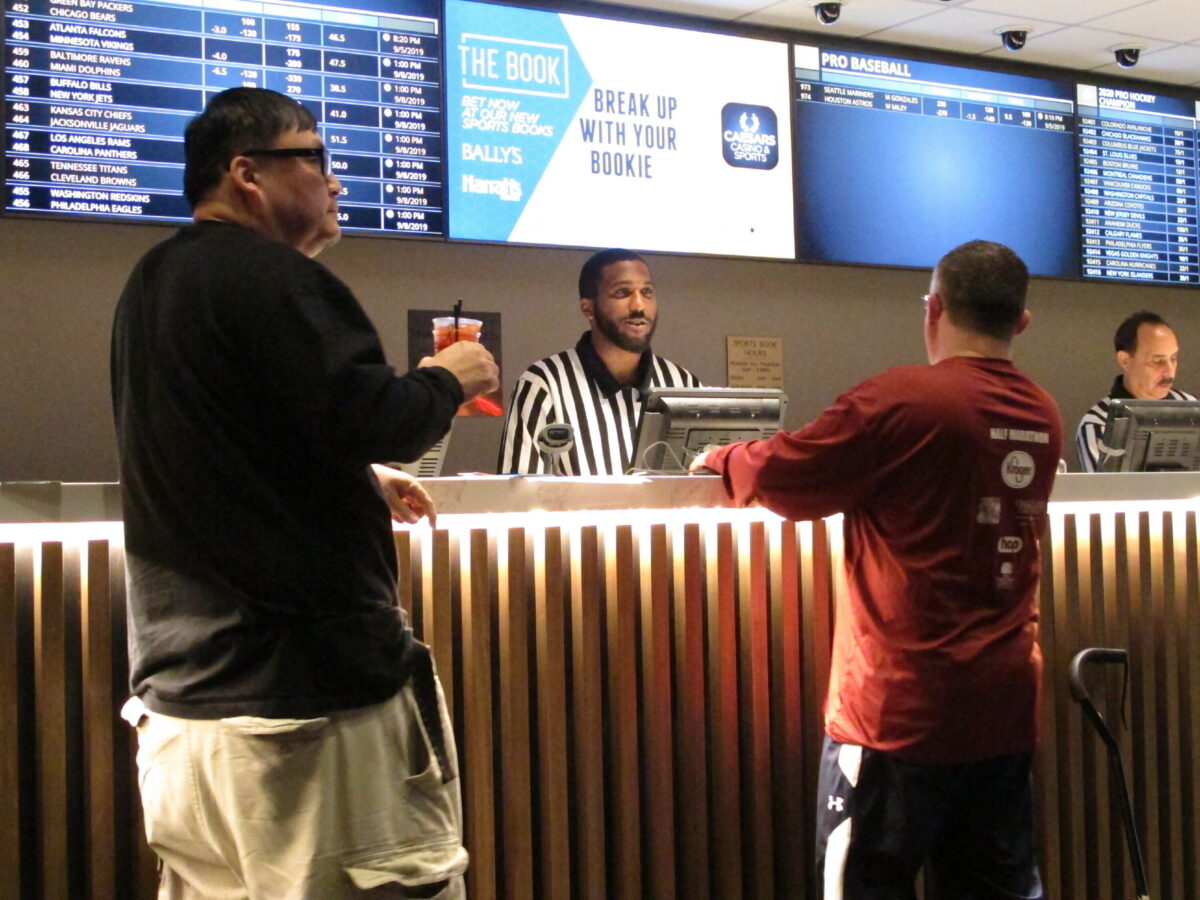America’s Deadly Epidemic
CommentaryThis year’s FIFA World Cup is well underway. Throughout the month-long tournament, millions of Americans, we’re told, will bet a total of $1.8 billion. This should come as no surprise. After all, Americans love to gamble. However, this love is quickly turning millions of Americans into gambling addicts. You’re more likely to be struck by lightning than you are to win the lottery; you’re also 4,000 times more likely to win an Oscar. But try telling this to the American people, many of whom spend $1,000 per year on lottery tickets. Between now and 2025, the U.S. lottery market size is expected to increase by almost $28 billion. The country’s lottery addiction is about to get far worse. For those who scoff at the idea of lottery addiction, there’s nothing funny about unhealthy compulsions. The United States is, in many ways, a nation of addicts. It is estimated that at least 2 million American adults meet the criteria for gambling disorder. Some estimates suggest that as many as 10 million Americans have a gambling addiction. Chronic gambling is closely associated with suicidal ideation. In fact, pathological gambling has a higher attempted suicide rate than any other addictive disorder, including alcoholism and drug addiction. In many ways, the gambling problem is being underplayed and underreported. Even bingo, a low-harm form of gambling, comes with a significant risk of addiction. Unsurprisingly, America’s gambling problem is being driven by technology. Why go to Las Vegas when the city of sin can come to you? As the author Stephen Marche noted, once, “there was Las Vegas”; now, “there’s a Las Vegas in every phone,” allowing users to bet on everything from the next pope to when the world is going to end. Of course, not all varieties of gambling are created equally. The likes of bingo simply can’t compete with the glitzy allure of sports betting, the newest form of gambling. Between 2019 to 2020, sports-betting revenues grew 69 percent; during the first quarter of 2021, revenues increased by a whopping 270 percent. Forget COVID-19; sports betting is poised to become the United States’ most crippling epidemic. A gambler makes a sports bet at Bally’s casino in Atlantic City, N.J., on Sept. 5, 2019. (Wayne Parry/AP Photo) Take poker, for example, the only form of gambling considered a sport. The world currently has 100 million poker players; approximately 60 million are in the United States. According to The New York Times, tens of millions of Americans regularly play online poker. The industry of online gambling is growing at an astonishing rate. By 2026, the online gambling market is expected to grow $142 billion in value, with more and more teens getting involved. Online poker is considerably more dangerous than traditional casino gambling because it’s more addictive and easier to spend money on. As the aforementioned Marche wrote, sports betting, once a “somewhat skeezy sideline to the entertainment dimension of sports,” now finds itself “front and center.” Marche emphasized the fact that influential ex-pros like Charles Barkley and Jalen Rose have endorsement deals with FanDuel and BetMGM and that “Disney—yes, Disney—owns a small stake in DraftKings.” Gambling is now an inextricable part of American culture. He’s right. Business is booming. Across sports media, gambling advertising and related content are ubiquitous, while partnerships between teams and betting companies—like the Arizona Cardinals opening a sportsbook on stadium grounds with online gambling operator BetMGM—have become commonplace. According to the American Gaming Association, 2012 saw Americans wager close to $54 billion in sports-related bets. If all 50 states were to legalize sports gambling, according to the Times, annual revenues would likely surpass $19 billion. A recent study conducted by the market research firm Leger for the Fantasy Sports & Gaming Association (FSGA) demonstrated how sports betting, and its addictions are becoming more diverse in nature; since 2019, the number of women placing bets has more than doubled. Three years ago, 9.4 million women, or 20 percent of the overall sports betting populace, placed bets. Today, 34 percent of 20.6 million of sports bettors are female. Is there a cure for the country’s gambling addiction? This is a question that has been asked before, and it’s a question that needs to be asked again. Worryingly, the answer appears to be no. If anything, as our lives become even more intertwined with various technological devices, there’s a high chance that the United States’ gambling problem will get considerably worse. Gambling responsibly comes down to self-control, a form of restraint that millions of Americans sorely lack. Views expressed in this article are the opinions of the author and do not necessarily reflect the views of The Epoch Times. Follow John Mac Ghlionn is a researcher and essayist. He covers psychology and social relations, an

Commentary
This year’s FIFA World Cup is well underway. Throughout the month-long tournament, millions of Americans, we’re told, will bet a total of $1.8 billion. This should come as no surprise. After all, Americans love to gamble. However, this love is quickly turning millions of Americans into gambling addicts.
You’re more likely to be struck by lightning than you are to win the lottery; you’re also 4,000 times more likely to win an Oscar. But try telling this to the American people, many of whom spend $1,000 per year on lottery tickets. Between now and 2025, the U.S. lottery market size is expected to increase by almost $28 billion. The country’s lottery addiction is about to get far worse. For those who scoff at the idea of lottery addiction, there’s nothing funny about unhealthy compulsions.
The United States is, in many ways, a nation of addicts. It is estimated that at least 2 million American adults meet the criteria for gambling disorder. Some estimates suggest that as many as 10 million Americans have a gambling addiction. Chronic gambling is closely associated with suicidal ideation. In fact, pathological gambling has a higher attempted suicide rate than any other addictive disorder, including alcoholism and drug addiction. In many ways, the gambling problem is being underplayed and underreported.
Even bingo, a low-harm form of gambling, comes with a significant risk of addiction. Unsurprisingly, America’s gambling problem is being driven by technology. Why go to Las Vegas when the city of sin can come to you? As the author Stephen Marche noted, once, “there was Las Vegas”; now, “there’s a Las Vegas in every phone,” allowing users to bet on everything from the next pope to when the world is going to end.
Of course, not all varieties of gambling are created equally. The likes of bingo simply can’t compete with the glitzy allure of sports betting, the newest form of gambling. Between 2019 to 2020, sports-betting revenues grew 69 percent; during the first quarter of 2021, revenues increased by a whopping 270 percent. Forget COVID-19; sports betting is poised to become the United States’ most crippling epidemic.

Take poker, for example, the only form of gambling considered a sport. The world currently has 100 million poker players; approximately 60 million are in the United States. According to The New York Times, tens of millions of Americans regularly play online poker. The industry of online gambling is growing at an astonishing rate. By 2026, the online gambling market is expected to grow $142 billion in value, with more and more teens getting involved. Online poker is considerably more dangerous than traditional casino gambling because it’s more addictive and easier to spend money on.
As the aforementioned Marche wrote, sports betting, once a “somewhat skeezy sideline to the entertainment dimension of sports,” now finds itself “front and center.” Marche emphasized the fact that influential ex-pros like Charles Barkley and Jalen Rose have endorsement deals with FanDuel and BetMGM and that “Disney—yes, Disney—owns a small stake in DraftKings.” Gambling is now an inextricable part of American culture.
He’s right. Business is booming. Across sports media, gambling advertising and related content are ubiquitous, while partnerships between teams and betting companies—like the Arizona Cardinals opening a sportsbook on stadium grounds with online gambling operator BetMGM—have become commonplace. According to the American Gaming Association, 2012 saw Americans wager close to $54 billion in sports-related bets. If all 50 states were to legalize sports gambling, according to the Times, annual revenues would likely surpass $19 billion.
A recent study conducted by the market research firm Leger for the Fantasy Sports & Gaming Association (FSGA) demonstrated how sports betting, and its addictions are becoming more diverse in nature; since 2019, the number of women placing bets has more than doubled. Three years ago, 9.4 million women, or 20 percent of the overall sports betting populace, placed bets. Today, 34 percent of 20.6 million of sports bettors are female.
Is there a cure for the country’s gambling addiction? This is a question that has been asked before, and it’s a question that needs to be asked again. Worryingly, the answer appears to be no. If anything, as our lives become even more intertwined with various technological devices, there’s a high chance that the United States’ gambling problem will get considerably worse. Gambling responsibly comes down to self-control, a form of restraint that millions of Americans sorely lack.
Views expressed in this article are the opinions of the author and do not necessarily reflect the views of The Epoch Times.












